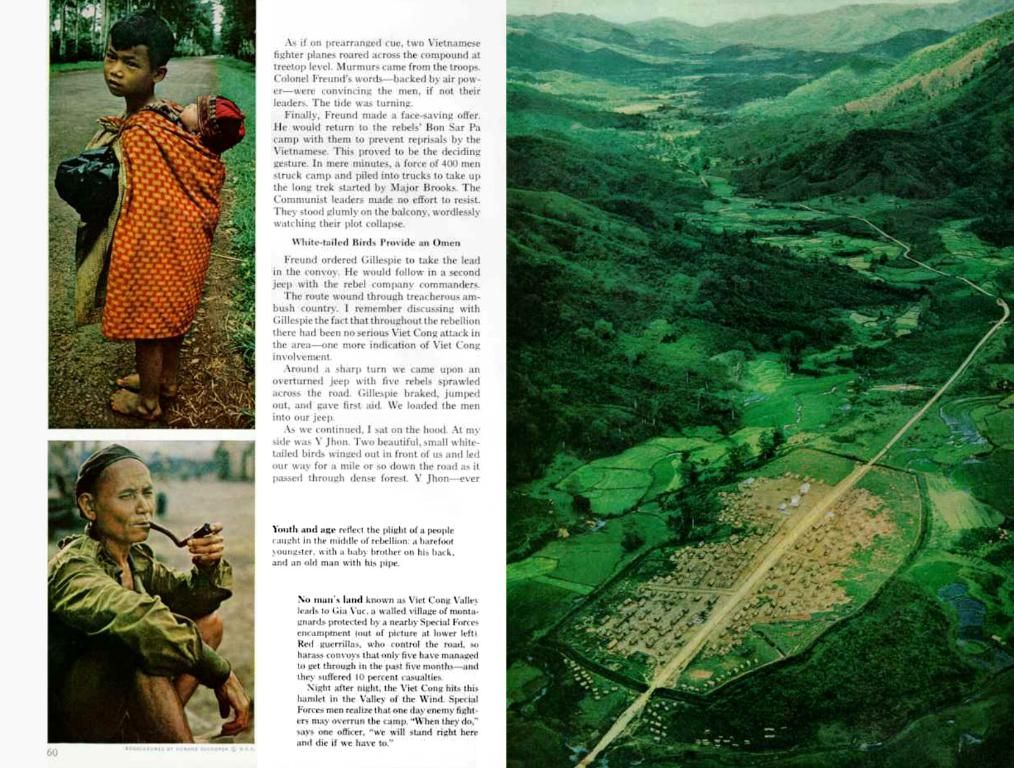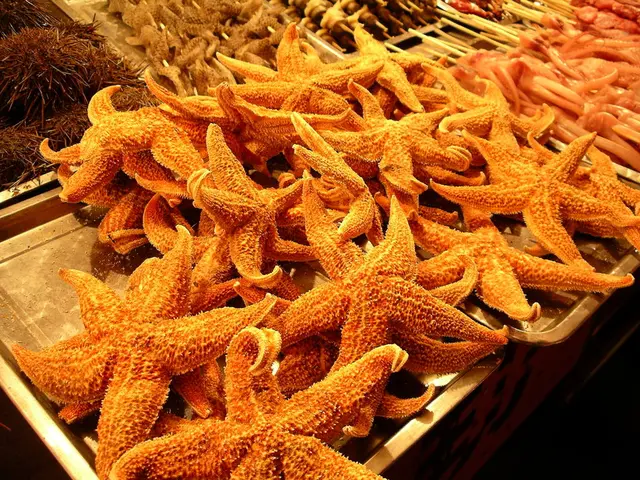Food Options for Pre-Hike Nourishment (Plus Suggestions for Along and Post-Hike!)
Cracking open the great outdoors and embarking on a hiking adventure is an exhilarating challenge that tests both your physical and mental stamina. But, with every mountain you conquer and valley you traverse, your body needs fuel to keep going. In this raw, unfiltered guide, we'll dodge the nitty-gritty details and get straight to the point on what, when, and how much to eat to bring your hiking game to new heights.
Let's Chow Down Before the Journey Begins
Fueling up before you hit the trail is integral to a successful hike. Aim for a meal rich in slow-digesting nutrition: complex carbs, protein, and healthy fats. Ideally, gobble this grub down 1-2 hours before you set forth on your adventure.
Complex Carbohydrates:
The king of energy sources, complex carbs provide a steady stream of sustainable fuel for your body. Opt for whole grains, legumes, and starchy veggies that offer long-lasting energy.
Protein:
Essential for muscle development and recovery, lean protein sources like grilled chicken, fish, tofu, turkey, or eggs should be your go-to pre-hike companions. If you're hankering for something heartier, legumes make a fine choice too.
Healthy Fats:
Slow-burning fats keep your tank full for extended periods. Indulge in nuts, seeds, nut butters, and healthy oils to keep your belly satiated and your energy levels high.
Staying hydrated is as important as the food choices you make. Top off your water bottles in the days and hours leading up to the trek and bring along more water for the trail. If you're seeking a bit more than just H2O, sports drinks can be your sweet-tasting sidekick, as they contain electrolytes to keep you hydrated.
Top 10 Delicious Pre-Hike Feasts
Now that we know what nutrients to look for, let's delve into the specific foods that embody the ideal pre-hike meal. In no particular order, here's our list of the 10 tastiest foods to begin your expedition:
- Lean Meat: Chicken, turkey, or fish provide a hefty dose of protein to power your hike.
- Vegetables: Snack on carrots, broccoli, or bell peppers before taking off to give your body an energizing boost. Elevate your veggie game by dipping them in hummus for a yummy, protein-packed treat.
- Fruits: Fill up on apples, bananas, or oranges – fruits are an excellent source of complex carbs to fuel your journey.
- Water: Feeling parched? You know what to do.
- Pasta: Carb-loading for a long day on the trail? Whole grain pasta is the way to go. Opt for a lighter sauce to keep your load light.
- Eggs: Boiled, scrambled, or fried – eggs are packed with protein and healthy fats to prime your muscles for a day on the trail.
- Greek Yogurt: Topped with honey or fruit, Greek yogurt is a protein-rich and probiotic-packed powerhouse that prepares your gut for the journey ahead.
- Nutrition Bars: With tons of varieties available, these bars can offer a balanced blend of nutrients to fuel your hike. Just make sure to choose one with minimal sugar.
- Nut Butter: Spread it on a whole grain toast for a protein-packed snack that also offers healthy fats.
- Oatmeal: Who said breakfast food can't be enjoyed on the trail? Oats are an excellent source of complex carbs that offer long-lasting energy, and they've even been found to aid in recovery. Add a drizzle of honey for a natural sugar boost and extra deliciousness. Bonus tip: If oats aren't your thing, try a whole grain protein pancake or waffle mix instead.
- Coffee: Grabbing a cup of joe might be just what you need to kick your hike into high gear. Coffee has been shown to enhance performance, especially for those who enjoy their caffeine fix[1]. Just have a pit stop before you hit the trail.
Chow Down on What Not to Eat
On the flip side, there are certain foods you should steer clear of before your hike. The worst enemy to a successful trek is an excessive sugar load that offers a quick burst of energy followed by a dreadful crash. Swerve these culprits before your hike:
- Cream-based soups or sauces: They're heavy, laden with fat, and will slow you down on the trail.
- Carbonated Drinks: Soda or energy drinks come with a high dose of caffeine and sugar – not great for pre-adventure fuel. If you crave a dose of caffeine, opt for black coffee instead.
- Dairy products: Milk, cheese, and other dairy products contain a high amount of fat and calories, making them an unwise choice before a hike.
- Fruit juices: Fruit juices are high on sugar and low on nutrients –жалейте вместо того, чтобы пить их до подъёма.
- Burger & Fries: This classic meal is loaded with empty calories that will weigh you down and leave you feeling sluggish.
- Candy: As tempting as it may be, steer clear of the sweets before your hike – they'll offer a quick sugar rush followed by a dreadful crash.
- Spicy Foods: Foods bursting with spices can irritate your digestive system during hiking, leading to an upset stomach or even diarrhea – two problems you definitely don't want to contend with on the trail.
Time to Fuel Up During the Hike
Keeping your energy levels up during your hike is crucial to powering through tough stretches. Snack on small meals every 2 hours or so to keep your engine humming along. Focus on foods that are easy to digest and packed with complex carbs. However, don't forget to keep the salt and sugar levels in check, as too much of either can leave you feeling worse for wear.
Snack-tastic Options for Your Tra incline:
- Trail mix that includes fruit and chocolate for a sweet and crunchy treat.
- Dark chocolate
- Dried fruit
- Candy (in moderation)
- Nut butters (think peanut, sunflower, or almond butter)
For shorter hikes, stick to quick-burning carbohydrates and sugars to boost your energy levels. If you're gearing up for a long day or multi-day hike, supplement your snacks with slow-digesting foods like protein and complex carbs.
Our personal favorite mini-meal for hiking is an all-natural PB&B – peanut butter and banana on whole grain bread, smothered in honey. Delicious, nutritious, and only a few vegan-friendly ingredients – perfection!
Want a hot meal on the trail? Bring along a camp stove and whip up a dehydrated meal. Our top picks are Backpacker's Pantry Pad Thai and Peak Refuel Biscuits and Gravy – amazing taste, excellent nutritional balance, and easy on the weight.
Refuel After Conquering the Mountain
After a grueling hike, your body needs serious recovery nutrition. Load up on protein, carbohydrates, and hydration to rebuild those muscles, replenish your energy stores, and rehydrate. Bonus points if you indulge in a post-hike treat – like a juicy burger and crispy fries – just because.
It's all about listening to your body, experimenting with different foods, and discovering what works best for you. Hiking isn't just about reaching the destination, but also the journey – and a well-nourished body is the perfect partner to make this adventure one to remember. Happy trails, fellow hikers!
Enrichment Data:
More Detailed Nutritional Recommendations:
- Choose nutrient-dense, whole foods: Whole foods offer a balanced blend of macro and micro nutrients that promote overall health and well-being. Prioritize real food over supplements and energy gels, as they contain preservatives, artificial flavors, and other questionable ingredients.
- Balance your macronutrients: Aim for a 60/30/10 split of carbohydrates, proteins, and fats in your hiking diet. This balance provides your body with the right amount of energy, muscle support, and cellular functioning for optimal performance.
- Plan ahead: Research local grocery stores, camping supply stores, or go online to find trail-friendly food options. Stock up on your hiking snacks and meals before you set off, ensuring you have everything you need to fuel your journey.
- Pack lightly: A heavy backpack can weigh you down and make your hike more challenging. Opt for lightweight, nutrient-packed food options to reduce the weight on your back.
- Stay flexible: Adapt your meals and snacks to the length and difficulty of your hike, as well as the weather conditions. If the trail is particularly lengthy or challenging, bring along more substantial meals, such as dehydrated meals, and supplement with energy bars or other high-calorie snacks.
- Embrace variety: Opt for a mix of fruits, vegetables, grains, lean proteins, and healthy fats to ensure that you're getting a balanced spectrum of nutrients. Incorporate different flavors, textures, and cuisines to keep your taste buds excited and your cravings at bay.
- Stay hydrated: Staying hydrated is essential for overall health, energy levels, and recovery. Carry a water bottle or hydration system with you on the trail, and refill as needed. Opt for purified water sources or carry water filters to ensure that you're drinking clean, safe water.
Additional Tips for Long-Distance Hiking:
- Pack dehydrated meals: Pre-made dehydrated meals like backpacker's freeze-dried meals are a quick, easy, and nutritious way to fuel your body on multi-day hikes. Just add hot water to rehydrate, and enjoy a warm, flavorful meal.
- Carry calorie-dense foods: High-calorie foods like energy bars, trail mix, dried fruit, nuts, and nut butters can provide the energy boost you need to power through long days on the trail. Opt for nutrient-dense options like dark chocolate, dried fruit, and nut butters over less healthy options like candy and chips.
- Embrace the community: Hiking communities are a wonderful resource for meal ideas, backpacking recipe swaps, and general advice. Connect with fellow hikers online or on the trail to share tips, tricks, and delicious food recommendations.
- Learn from the experts: Consult the experts, like thru-hikers and outdoor food bloggers, for expert advice on meal planning and packing, as well as tips on meal preparation and nutrition.
- Pack a variety of snacks: Carrying a variety of snacks ensures that you always have something tasty on hand to munch on during breaks or when you need a quick energy boost. Opt for nutrient-dense foods like fruit, nuts, trail mix, and energy bars to keep your energy levels up and your hunger at bay.
- Stay hydrated: Hydration is essential for long-distance hiking, as it helps prevent fatigue, cramps, and other health problems. Pack a water bottle or hydration system, and carry purification tablets or a portable water filter to ensure clean, safe water.
- Allow for flexibility: Hiking is an adventure, and there will inevitably be bumps in the road. Aim to be flexible in your meal planning and packing, and adjust as needed to accommodate weather, terrain, and other unforeseen challenges.
Happy hiking, food lovers!
[1] Brill, J., & Fiore, A. M. (2006). Caffeine as an ergogenic aid in physical activity. Current sports medicine reports, 5(5), 227–232.[2] Kant, N. (2014). The Ultimate Hiker's Gear List. Retrieved from https://www.backpacker.com/gear/first-aid/the-ultimate-hikers-gear-list-2014/[3] Tillery, S. M. (2017). The Athlete's Plate: Nutrition and Performance: Understanding the role of proper nutrition on athletic performance with nutrient-dense meal plans. Undy Press.
Here are five sentences that incorporate the given words and follow from the provided text:
- To fuel your body for that fitness-and-exercise adventure, consider packing nutrient-dense energy bars and cooking healthy-cooking meals beforehand.
- Once you set off on your hiking expedition, remember to hydrate with science-backed electrolyte-rich sports drinks instead of carbonated beverages.
- To keep your energy levels high and your body nourished, embark on your hiking journey with dietary complex carbs, lean proteins, and healthy fats found in lifestyle foods like oatmeal, eggs, and nuts.
- Cooking quick-and-easy meals, such as Backpacker's Pantry Pad Thai or Peak Refuel Biscuits and Gravy, can help improve your overall health-and-wellness during your hiking adventure.
- As you conquer the mountains and enjoy food-and-drink rewards like juicy burgers and crispy fries, also remember to refuel with protein-rich meals and hydrating beverages for increased health benefits.







